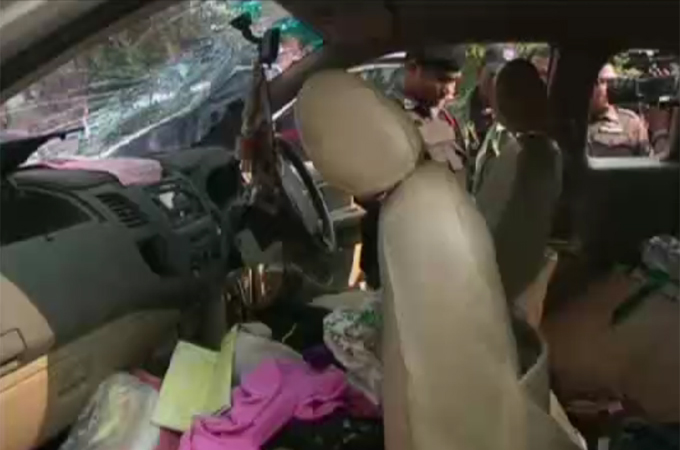Thai protest leader killed amid poll tensions
Politician shot in Bangkok suburb on a day government’s opponents tried to disrupt advance voting for general election.

An anti-government protest leader has been killed and 11 people wounded amid a siege of polling stations in Thailand’s capital, Bangkok, by demonstrators seeking to disrupt advance voting for next weekend’s controversial general election.
The death occurred on Sunday, when anti-government demonstrators surrounded dozens of polling stations in Bangkok and several southern provinces to stop advance voting for next week’s vote, chaining gates shut, threatening voters and preventing hundreds of thousands of people from casting ballots.
The February 2 election was called by Yingluck Shinawatra, the prime minister, to try to calm rising political tensions after weeks of mass anti-government protests.
As the disrupted polls closed on Sunday afternoon, Suthin Tharathin – a leader of the Dharma Army, a Buddhist organisation which has been prominent in the anti-government demonstrations – was shot as he stood on the back of a pick-up vehicle in the Bangkok suburb of Bang Na.
Nine other people were injured in the shooting, according to Bangkok’s Erawan emergency centre.
Akanat Promphan, a protest spokesman, accused a “pro-government mob” of carrying out the attack which killed Suthin.
Police later said he died when a group of Red Shirts – government-supporting activists – from a neighbouring province a few kilometres away clashed with protesters.
Election panel criticised
Sunday’s incidents proved that demonstrators struggling to overthrow Yingluck have the ability to disrupt the general election, and the country’s electoral commission is unlikely to stand in their way.
The protest movement, known as the People’s Democratic Reform Committee, had pledged not to obstruct Sunday’s poll.
Akanat, the protest spokesman, said those who had locked the gates of polling stations had “acted on their own”, saying that the decision to close stations was made by Election Commission officials.
 |
| Suthin Tharathin was shot as he stood on the back of a pick-up vehicle in a Bangkok suburb on Sunday |
The protesters’ effort, however, appeared to have been widely coordinated.
Across Bangkok, demonstrators waving the Thai flag physically blocked electoral officials, ballot boxes and voters from getting inside polling centres.
Some did vote – one woman climbed over a padlocked gate to try to do so – but officials ultimately shut polling stations in 83 of the nation’s 375 constituencies, authorities said.
About 49 million of the nation’s 64 million people are eligible to cast ballots in February, and 2.16 million applied for early voting.
However, even before Sunday’s violence, there had been increasing doubt that the main poll would go ahead next week.
Even if it does, parliament is unlikely to achieve the quorum it needs to convene, which would prevent a new government from being formed.
Officials of Yingluck’s governing party have suggested they are willing to delay next week’s ballot, but only if protests end and the main opposition party abandons its boycott.
Power struggle
The protesters are demanding Thailand’s democracy be put on hold. They want Yingluck’s government replaced by a “people’s council” that would implement anti-corruption reforms before elections.
They also accuse her of corruption and allege the ruling party has employed its electoral majority to subvert democracy.
Much of the protest movement’s anger is directed at Yingluck’s family.
She is seen by her critics as remotely controlled by her billionaire brother Thaksin Shinawatra, an exiled former prime minister who was accused of using his family fortune and state funds to influence voters.
Thaksin was toppled in a 2006 coup that provoked a struggle between that in broad terms pits Thailand’s rural north against an urban elite backed by royalists and the south.
Reacting to Sunday’s developments in Thailand, Jen Psaki, the State Department spokesperson, said the US is “deeply troubled” by the efforts to block polling stations and prevent voting and urged all sides “to refrain from violence” and “exercise restraint”.
“While we do not take sides in the political dispute and strongly support freedom of expression and the right to peaceful protest, preventing citizens from voting violates their universal rights and is inconsistent with democratic values,” she said in a statement.